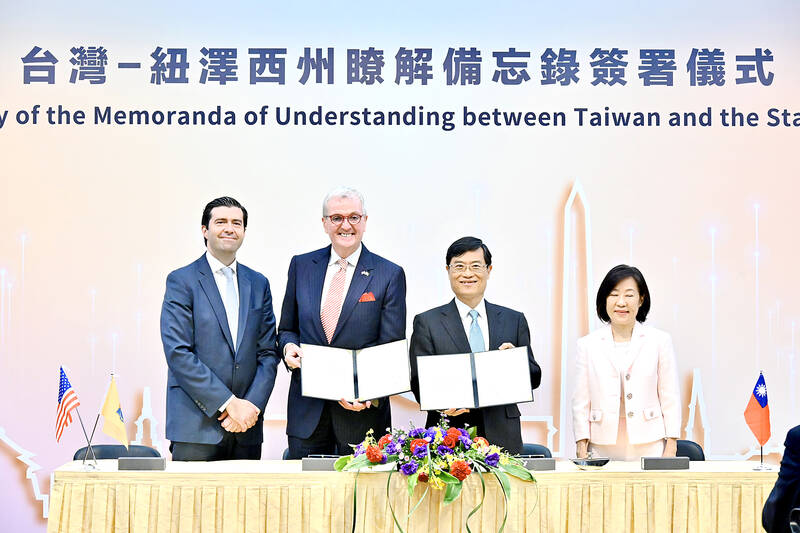New Jersey plans to open an Asia-Pacific economic and trade office in Taipei, state Governor Phil Murphy said at a meeting with President Tsai Ing-wen (蔡英文) in Taipei yesterday.
The first sitting governor of New Jersey to visit Taiwan, Murphy, who is leading a 40-member delegation, also witnessed the signing of three agreements with Taiwan to boost ties in trade, education and information sharing.
The mutually beneficial trade relationship between the US state and Taiwan generates more than US$4 billion in value a year, he said.

Photo: George Tsorng, Taipei Times
Murphy said he believed the office “will take our long-standing relationship between Taiwan and New Jersey to new heights [and] will strengthen both the economic and cultural ties that have bound our peoples together for decades.”
He pledged to cooperate with Taiwan in preserving a free and open Indo-Pacific region, “and importantly, planting a flag in Taipei, not just for Taipei or Taiwan, but to use this as our base for all of Asia.”
There is “limitless potential” for bilateral cooperation, including in pharmaceuticals, life sciences, telecommunications and the green economy, which can create more job opportunities and build a bright future for families on both sides, he said.
While geographically small, New Jersey and Taiwan “both punch way above our weight” and share a lot in common, such as an innovation economy and emphasis on nurturing talent, he said.
New Jersey established sister-state relations with Taiwan in 1989 and the state legislature re-ratified the bill this year, Murphy said.
New Jersey is home to the fourth-largest Taiwanese community in any US state, including a large number of Taiwanese students, he said.
Tsai thanked Murphy for his show of support by visiting Taiwan, as well as the New Jersey Senate and House of Representatives for passing resolutions to back the nation’s international participation this year.
Many Taiwanese businesses chose to invest or set up bases in New Jersey as it is a hub for US biotechnology and communication technology industries, as well as an important gateway to US markets in the east, she said.
Tsai welcomed the state’s decision to open an office in Taipei, which could further deepen bilateral trade and economic relations, she said.
Murphy’s policies centered on an innovation economy and local infrastructure are in line with Taiwan’s “5+2 Innovative Industries Plan” and the “six core strategic industries” program, she said, adding that she hoped to see closer cooperation with the state to build a stable and safe global supply chain.
Later yesterday, Murphy witnessed the signing of a Collaboration Agreement on Economic and Trade Cooperation between the Ministry of Economic Affairs and the New Jersey Economic Development Authority, as well as two other memorandums of understanding (MOU).
The MOU on education is to promote bilateral cooperation in language education and STEM (science, technology, engineering and mathematics) education under the US-Taiwan Education Initiative.
The Financial Supervisory Commission and the New Jersey Department of Banking and Insurance signed an MOU to facilitate the sharing of information relating to financial supervision and exchanges of experience.
People-to-people exchanges and bilateral investment and trade between Taiwan and New Jersey have grown in recent years, Minister of Foreign Affairs Joseph Wu (吳釗燮) said at the signing ceremony.
“I believe that the MOU we’re signing today will pave the way even stronger and more structured collaboration,” Wu added.

Taiwan is stepping up plans to create self-sufficient supply chains for combat drones and increase foreign orders from the US to counter China’s numerical superiority, a defense official said on Saturday. Commenting on condition of anonymity, the official said the nation’s armed forces are in agreement with US Admiral Samuel Paparo’s assessment that Taiwan’s military must be prepared to turn the nation’s waters into a “hellscape” for the Chinese People’s Liberation Army (PLA). Paparo, the commander of the US Indo-Pacific Command, reiterated the concept during a Congressional hearing in Washington on Wednesday. He first coined the term in a security conference last

Prosecutors today declined to say who was questioned regarding alleged forgery on petitions to recall Democratic Progressive Party (DPP) legislators, after Chinese-language media earlier reported that members of the Chinese Nationalist Party (KMT) Youth League were brought in for questioning. The Ministry of Justice Investigation Bureau confirmed that two people had been questioned, but did not disclose any further information about the ongoing investigation. KMT Youth League members Lee Hsiao-liang (李孝亮) and Liu Szu-yin (劉思吟) — who are leading the effort to recall DPP caucus chief executive Rosalia Wu (吳思瑤) and Legislator Wu Pei-yi (吳沛憶) — both posted on Facebook saying: “I

The Ministry of Economic Affairs has fined Taobao NT$1.2 million (US$36,912) for advertisements that exceed its approved business scope, requiring the Chinese e-commerce platform to make corrections in the first half of this year or its license may be revoked. Lawmakers have called for stricter enforcement of Chinese e-commerce platforms and measures to prevent China from laundering its goods through Taiwan in response to US President Donald Trump’s heavy tariffs on China. The Legislative Yuan’s Finance Committee met today to discuss policies to prevent China from dumping goods in Taiwan, inviting government agencies to report. Democratic Progressive Party Legislator Kuo Kuo-wen (郭國文) said

Sung Chien-liang (宋建樑), who led efforts to recall Democratic Progressive Party (DPP) Legislator Lee Kun-cheng (李坤城), was released on bail of NT$80,000 today amid outcry over his decision to wear a Nazi armband to questioning the night before. Sung arrived at the New Taipei District Prosecutors’ Office for questioning in a recall petition forgery case last night wearing a red armband bearing a swastika, carrying a copy of Adolf Hitler’s Mein Kampf and giving a Nazi salute. Sung left the building at 1:15am without the armband and covering the book with his coat. Lee said today that this is a serious